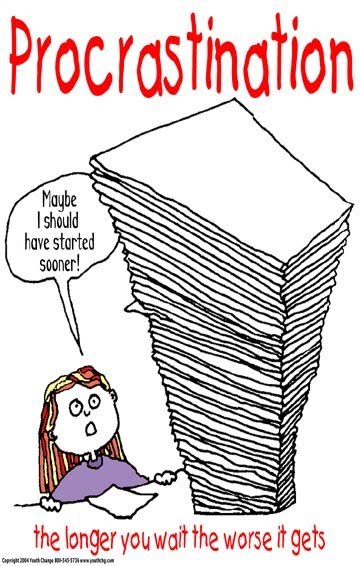@english Procrastination.
Let's start by defining exactly what the term procrastination means, since it is not something that is usually talked about.
This word comes from Latin:
PRO, which means forward,
CRASTINUS, referring to the future.

Therefore, procrastination refers to the habit of postponing activities or situations that must be addressed, replacing them with other more irrelevant or pleasant situations.
In psychology, the term is applied to define the feeling of anxiety generated by a pending task to be completed.
In general, it is normal to suffer procrastination, but there are specialists in procrastination who behave this way continuously because they somehow believe that tomorrow will be more appropriate to carry out one or several tasks that are pending.

But in reality procrastination is a problem of terrible time organization.
Whoever postpones or procrastinates what he is doing in the background is a clearly evasive behavior.
Consequences of procrastinating

- feeling of chaos,
- frustration
- accumulation of pending tasks.
- feelings of dissatisfaction, insecurity, inferiority and stagnation.
- it ends up losing the trust and respect of others.
If you think you have attitudes that lean towards procrastination, do not be discouraged. Below I will present a list to stop procrastinating ....
Do you want to get out of Procrastination? Then follow the following strategies.
Avoid distractions. The more temptations you have to do something else instead of what you have to do, the easier it will be to procrastinate. Keep your mobile, notifications and internet access disconnected when you're ready to take on complicated tasks.
Check your goals regularly. If a task is complicated, uncertain or boring, but it is important to achieve a goal, always keep in mind that goal should help you not procrastinate.
Use the Rule of Two Minutes. The Rule of Two Minutes says that if you are planning an action that can be done in less than two minutes, do not plan it; Make it. You can extend that time to 5 or 10 minutes. If you make this rule a habit, there will be a multitude of tasks that you will not have the opportunity to postpone.
Track your time. Write down somewhere what tasks you do each day and how much time you have devoted to each one. By writing down your time you create an internal commitment that makes you more responsible with respect to how you use it.
Learn to say no. I bet that many of the tasks that you postpone are commitments that you have sought because you do not know how to say no.
Manage your energy, not your time. It is important that you work at your best moments. If you are exhausted or in a bad mood, your chances of procrastinating increase considerably.
Use a short list of tasks. A long list can ruin your sense of control and become a source of stress and frustration. The shorter your list of upcoming actions, the easier it will be to focus on what you really have to do.
Friends of Steemit, if there is anything else that helps you not to procrastinate, leave your comment.
Congratulations @rosymendezb! You have completed some achievement on Steemit and have been rewarded with new badge(s) :
Click on any badge to view your own Board of Honor on SteemitBoard.
For more information about SteemitBoard, click here
If you no longer want to receive notifications, reply to this comment with the word
STOP